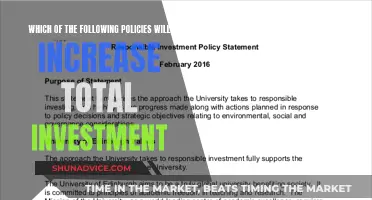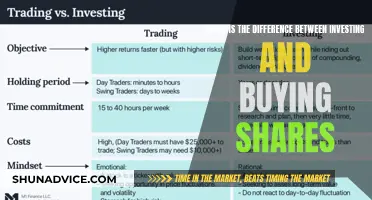
Investing for retirement is a long-term process that requires discipline and a good understanding of your financial goals. The earlier you start, the more time your money has to grow, and the power of compounding interest can significantly increase your savings over time.
Even small amounts like $50 a month can add up, and investing early can be more beneficial than waiting until you have a larger sum. It's important to have a plan, automate your investments, and take advantage of employer-sponsored retirement plans and their matching contributions.
By starting early, you can also afford to take more risks with your investments, which can lead to higher returns. Additionally, investing for retirement can help reduce your taxable income and lower your tax bill.
The key is to start now, be consistent, and seek financial advice when needed to ensure you're on the right path towards a comfortable retirement.
| Characteristics | Values |
|---|---|
| Time | The sooner you start saving for retirement, the more time your money has to grow. |
| Interest | Compound interest is the best reason to start saving early. |
| Age | The younger you are, the more time you have to save. |
| Expenses | Saving early means you can save smaller amounts each month. |
| Risk | The longer you wait, the more you'll need to invest each month. |
| Goals | Investing early means you can set more realistic goals. |
| Income | The longer you save, the more income you'll have in retirement. |
What You'll Learn

The power of compound interest
Compound interest is a powerful tool for growing your wealth over time. It is the process by which a sum of money grows exponentially due to interest building upon itself over time. The earlier you start investing, the more time your money has to grow, and the more you'll benefit from compound interest.
For example, let's say you invest $1,000 in a long-term bond that earns 3% interest per year. At the end of the first year, your investment will grow by $30, and you'll have $1,030. In the second year, you'll earn 3% interest on the new total of $1,030, so your investment will grow by $30.90. This may not seem like much, but the power of compound interest really shows its strength over time.
By the 39th year, your investment will have grown to around $3,167, and by the 40th year, it becomes $3,262.04—a one-year difference of $95. Your money is now growing more than three times as quickly as it did in the first year. This is how the "miracle of compounding earnings on earnings" works, as financial expert Charlotte A. Dougherty explains.
Let's look at another example. Say you start investing in the market at $100 a month, with an average return of 1% per month or 12% per year, compounded monthly over 40 years. Your friend, who is the same age, doesn't start investing until 30 years later. They invest $1,000 a month for 10 years, also averaging 1% per month or 12% per year, compounded monthly.
Who will have more money saved up in the end? Your friend will have saved around $230,000, while your retirement account will be just over $1.17 million. Even though your friend was investing over ten times as much as you toward the end, the power of compound interest makes your portfolio significantly bigger.
Compound interest works in your favour, especially when you start early. It allows you to grow your wealth over time, even with small contributions. So don't wait—start investing today and let compound interest work its magic.
Investor Priority: Peace of Mind
You may want to see also

How to save with a tight budget
Saving for retirement is a long-term goal and the sooner you start, the better. Even if you are on a tight budget, there are ways to set aside money and build a savings account. Here are some tips on how to save with a tight budget:
- Focus on small changes: Every spending decision adds up, so making your lunch instead of buying it or brewing your coffee can help you save. Other changes include turning off lights when not in use, cutting cable and opting for cheaper streaming services, and avoiding impulse purchases.
- Automate your savings: Use mobile banking apps with automatic savings features or download third-party savings apps that estimate how much you can save each month and move that money into a savings account.
- Earn interest on your checking account: Look for an interest-checking account that doesn't have minimum balance requirements or monthly service fees and offers a competitive yield.
- Take advantage of extra paychecks: If you receive a paycheck every two weeks, you will receive two months a year with an extra paycheck. Allocate this extra money towards paying off high-interest credit card debt or building an emergency fund.
- Shop around for insurance rates: Compare prices on auto and homeowners insurance every few years. You may be able to save by staying with your current company or switching/merging both auto and homeowners insurance with the same company.
- Refinance your mortgage: If you can reduce your mortgage interest rate by 0.5% or more, refinancing could save you thousands of dollars over the life of the loan.
- Save on rent: Consider moving to a smaller place or a less costly area, or try negotiating your rent or lease terms to save money on rent.
- Take advantage of pre-tax savings options: Contribute to your employer-sponsored retirement plan, such as a 401(k), which uses pre-tax dollars to fund your retirement and can lower your taxable income. Some employers will even match your contributions.
- Take stock of food spending: Making your own meals and cutting down on dining out can help you save money on food, which is often one of the most expensive categories in a budget.
- Find cheaper ways to travel: When planning a trip, establish a budget, book budget-oriented accommodations, pick up groceries instead of eating out, and use a credit card that doesn't charge foreign transaction fees.
- Check your paycheck withholdings: Instead of getting a large tax refund each year, adjust your W-4 tax form to keep more cash in your paycheck. This gives you more money to put towards saving or paying off debt throughout the year.
REITs: A Smart Real Estate Investment?
You may want to see also

The importance of saving early
Compounding Interest
Compound interest is a powerful tool that allows your savings to grow exponentially over time. The earlier you start saving, the more time your money has to grow and benefit from compound interest. Even small contributions can make a significant difference in the long run. For example, investing $50 a month at a moderate 5% annual growth rate can lead to impressive savings over time.
Time is on Your Side
When you start saving early, you have time on your side. This means you can afford to save smaller amounts each month, as compound interest will work in your favour. The longer you wait, the more you'll need to invest each month to catch up.
Reaching Retirement Goals
Starting early increases the likelihood of reaching your retirement goals. By contributing a modest amount regularly, you can build a substantial nest egg. For example, if you start saving $3,000 per year at age 25 for ten years and then stop contributing, your funds will have 30 years to grow. Assuming a 7% annual growth rate, your $30,000 contributions will grow to almost $315,500 by the time you retire.
Building a Strong Financial Foundation
Saving early allows you to build a solid financial foundation for your future. It ensures that paying your future self is just as important as paying your bills or other necessary expenses today. While there may be months where unexpected expenses arise, pushing through these challenges will be rewarding in the long run.
Taking Advantage of Employer-Sponsored Plans
If you have access to an employer-sponsored retirement plan, such as a 401(k) or similar plan, start contributing as early as possible. Many employers will match your contributions up to a certain level, which is essentially free money that can boost your savings over time.
In conclusion, saving early for retirement is crucial to building a secure financial future. By taking advantage of compound interest, time, and employer-sponsored plans, you can increase your chances of reaching your retirement goals and enjoy a comfortable retirement.
Who Really Knows How to Invest?
You may want to see also

The impact of inflation
Inflation is one of the biggest risks to retirement plans. It can significantly reduce your spending power when you're living on a fixed income. Even a small hike in inflation can have a sizable impact. For example, a 60-year-old person's $1 million account would only have a purchasing power of $531,026 when they turned 85, after 2.5% inflation.
- Delay claiming Social Security benefits: Waiting until you're 70 to start collecting Social Security could give you lifetime monthly benefits that are about 77% higher than if you started at 62.
- Invest for growth and rebalance regularly: Consider investing in bonds, which have become more attractive due to higher inflation and interest rate increases. Diversifying your portfolio with stocks, bonds, and cash can help protect against inflation.
- Consider annuities: Annuities can provide a consistent stream of fixed income for life or a specified period. This can give you the confidence to pursue a more growth-oriented investing approach with your remaining assets.
- Prepare for future long-term care costs: Contribute as much as you can to a health savings account (HSA) to offset rising healthcare costs, which tend to increase faster than inflation. Alternatively, consider a life insurance policy with a long-term care benefit rider.
- Review your budget and adjust spending: Find ways to cut costs and control expenses, such as conserving energy usage or reducing discretionary spending.
- Maintain a proper allocation to stocks: Stocks have historically averaged annual returns well above average inflation, making them an effective tool to protect your savings.
- Maintain an appropriate cash cushion: Having a healthy cash position can cover unavoidable expenses during inflationary periods and limit the amounts you need to withdraw from your long-term investments.
- Regularly consider the impact of inflation on your financial plan: An effective retirement strategy relies on an accurate estimate of your spending, which may change in a high-inflation environment.
Retirement Investments: Safe Options for the Elderly
You may want to see also

How to save without a 401(k)
Investing for retirement without a 401(k) is challenging, but not impossible. Here are some alternative ways to save for retirement:
Individual Retirement Accounts (IRAs)
There are two main types of IRAs: traditional and Roth. The difference lies in when you pay taxes on your contributions and the account's earnings. With a traditional IRA, you get an upfront tax break as you can deduct contributions from your income when filing your tax return. The money then grows tax-free, but you pay taxes when withdrawing it during retirement. On the other hand, a Roth IRA doesn't offer an upfront tax break, but qualified withdrawals are tax-free. These are withdrawals made after you turn 59 1/2 from accounts that have been established for at least five years. This is advantageous if you expect to be in a higher tax bracket during retirement.
Health Savings Accounts (HSAs)
A Health Savings Account (HSA) is another way to boost your retirement savings. HSAs are intended for healthcare expenses but can provide a valuable income source in retirement. Contributions to HSAs are tax-deductible, lowering your tax bill in the contribution year. Withdrawals are also tax-free if used for healthcare expenses, including dental and vision care. There is no time limit on using the funds in an HSA, so you can save them for retirement without penalty.
Taxable Investment Accounts
If you've maxed out your IRA and/or HSA, consider a taxable investment account such as a non-retirement account or brokerage account. These accounts don't offer tax advantages, but you may earn better returns than with a regular savings account. You can invest in stocks, bonds, mutual funds, exchange-traded funds (ETFs), and/or real estate investment trusts (REITs). However, earnings are subject to capital gains taxes, so plan accordingly.
Tax-Deferred Annuities
Annuities, offered by insurance companies, provide tax deferral and varied investment opportunities. They can be a reliable income stream during retirement, though the money you invest is taxed when you withdraw it. Annuities typically offer fixed, indexed, or variable interest rates.
Real Estate Investments
You can save for retirement by investing in real estate, either directly or through a mutual fund, ETF, or REIT in your IRA or brokerage account. You could buy a multi-family home, live in one section, and rent out the other to reduce living expenses while paying down the mortgage. Later, you can decide to continue renting or sell the property and use the proceeds for living expenses or other investments.
Small Business Investments
Another option is to invest in a small business, either as an owner or a silent partner. Small business investments offer the potential for higher returns than other options, but they also carry more risk. There is no guarantee that your investment will generate substantial returns over time.
Quantum Computers: The Next Investment Boom
You may want to see also
Frequently asked questions
The earlier you start investing, the more time your money has to grow. Time is more important than the amount of money you invest. Even if you can only afford to invest a small amount each month, it's worth starting now and taking advantage of compound interest.
Compound interest is when the funds you contribute to your retirement plan earn interest, and this eventually grows to an amount large enough to begin earning interest itself. This creates a snowball effect, significantly increasing your savings over time.
Even a small amount each month will help. You can start with as little as $50 per month and increase the amount when your budget allows. Setting up a monthly recurring contribution is easy and will give your money a chance to grow over time.
A:
- Take advantage of 401(k) matching contributions if your employer offers this.
- Automate your investments by setting up regular contributions from your paycheck.
- Educate yourself about investing and create a budget that works with your investment plan.







